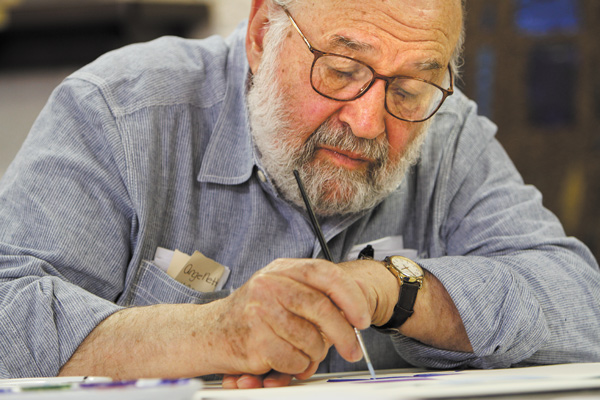Hebrew alphabet inspires Rosenstein's calligraphy artwork


Mordechai Rosenstein concentrates on starting a painting focusing on Israel and related elements during an open house Thursday at Temple El Emeth in Liberty. The artist uses the Hebrew alphabet as his inspiration, incorporating bright colors and various shapes to convey a theme.
By LINDA M. LINONIS
Liberty
Mordechai Rosenstein spells out his love of art, belief in Judaism and appreciation of the world through the Hebrew alphabet.
The artist said he “has great appreciation for the art form of Hebrew letters that are almost pictorial.”
He incorporates various shapes and colors into the Hebrew calligraphy to create works of art, some three-dimensional. “God gives everyone a talent. I’m lucky to be doing what I want to do,” he said.
On Thursday at an open house at Temple El Emeth, he demonstrated to guests how his artwork takes shape. Starting with the concept of Israel, Rosenstein said he would use sites such as Jerusalem and the Dead Sea into the piece. “I don’t sketch it out anymore; that comes with age,” he said. “I start with an idea, and it gets its own life.” He paints the piece upside down, which he finds works for him.
He also invited onlookers to “fill in” shapes he drew to invest them in the process. They were excited to be a part of it.
Rosenstein’s works are displayed at Emes Editions gallery in Elkins Park, Pa., a suburb of Philadelphia, where he and his wife, Mati, live. The temple will host an exhibit and sale of his artwork Sunday.
Among the prints featured is one with the phrase, “justice, justice, shalt thou pursue” from Deuteronomy 16:20. It’s the one that launched his artistic career.
Rosenstein said he can remember as a boy in Hebrew school “being intrigued” by Hebrew letters. He studied at Philadelphia College of Art, where he was influenced by abstract expressionist Franz Kline.
Though instructors opened other avenues of art for him, Hebrew calligraphy remained a hobby. “I came to be the next Picasso,” Rosenstein said of his art-school days.
After graduation, he was drafted and spent 1955 to 1957 in the U.S. Army then became a textile designer in New York City, where he met his future wife. “We lived in the Village, and calligraphy was like a hobby for me, an outlet after work,” he recalled.
An uncle in Philadelphia asked him to work at his frame shop, where he worked from 1967 to 1976 until the shop closed. After he opened his own shop, a customer, who knew he did calligraphy, asked him to do a piece for the Temple University president. He made two versions using the “justice, justice, shalt thou pursue” quote.
In 1979, Rosenstein partnered with Saul Zalesne, a salesman, who ended up selling “justice” prints to banks and lawyers. “The line got started,” Rosenstein said. Zalesne remains a partner, and Barry Magen joined the company in 2003.
A trip to a convention of the National Association of Synagogues opened another avenue to market his artwork. “We started to travel ... to anywhere that would have me,” Rosenstein said. “I love the road ... meeting new people.” The artist has traveled the world sharing his art, which is in synagogues, museums and personal collections.
His unique artwork using the Hebrew alphabet as a basis gained in popularity. “I make art, and I make a living at it,” Rosenstein said. “I use my life experience as inspiration,” he said.
The 79-year-old artist said he still has “a steady hand” and remains intrigued by the shapes of the letters. Though the artwork is based on Hebrew letters, you don’t have to be Jewish to appreciate it or own it. Rosenstein uses universal concepts such as the tree of life, family, learning and music.
 43
43
